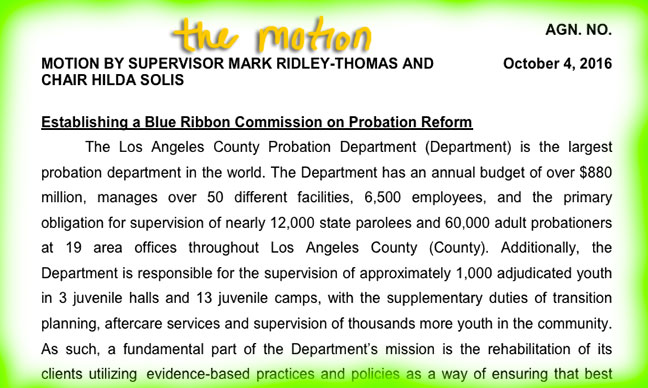UPDATE: On Tuesday, after hearing from advocates and others concerned about certain aspects of a motion to create a Blue Ribbon Commission on Probation Reform, the LA County Supervisors decided to postpone the scheduled vote for two more weeks in order to clarify and improve on the proposed plan. WLA will have more on this story tomorrow.
Today, the Los Angeles County Board of Supervisors is slated to consider a motion to form a Blue Ribbon Commission on Probation Reform (similar to the Citizen’s Commission on Jail Violence) to assess problems within the troubled department and to coordinate and bring about reforms to better protect and rehabilitate kids in camps and the youth and adults under supervision.
Here’s a clip from the motion by Supervisors Mark Ridley-Thomas and Hilda Solis explaining the need for a blue ribbon panel:
Significant work is underway with the potential to produce meaningful outcomes; however, there is a deficiency in the synchronization of all the current moving elements. A commitment to existing efforts is critical, but integration is required to ensure that true culture change in the Department can be sustained.
Furthermore, new evidence continues to emerge that the Department is still troubled and that additional strategies are needed. As an example, the Department presented data to the Probation Commission showing that use of force incidents in the juvenile halls had nearly doubled from January to July 2016. Other allegations of misconduct in the camps and halls have also surfaced, indicating systemic issues. Despite years of attempted reform, and a growing price tag of operating the camps and halls (with an estimate from a Department audit of a rate of $552 per youth per day), there is widespread concern amongst the Board, Department leadership, and community stakeholders that sustainable reform has yet to be realized. Moreover, the current efforts, while bold and important, are not exhaustive. Gaps still remain in what the Board is currently assessing regarding Department reform. These gaps include: the implementation of state mandates aimed at the adult population, including SB 678 and AB 109; communication and coordination with other agencies serving the same youth and families; racial and ethnic disparities in youth detention and incarceration; inadequate high-quality alternatives to incarceration; and a process for calculating the allocation of Department resources, including opportunities for community input.
The Department’s continued struggle to fulfill its mission of keeping its clients safe, let alone provide for their rehabilitation, underscores that more is still needed and that new approaches should be explored. The time has come for the Board to confirm its commitment to transparency, accountability and sustained transformation. The Board would be best informed by an independent review from an external panel of recognized experts on how, in coordinating the many existing efforts aimed at structural reform and adopting other necessary policy and practice changes, the Department can finally fulfill its mission of protecting, rehabilitating and supervising youth and adults. This type of independent review has been essential in moving forward change in other areas. For example, the Citizen’s Commission on Jail Violence was the impetus for creating the Office of Inspector General, which is positioned to play a prominent role moving forward in providing meaningful oversight of and pushing forward improvements in the jails.
The ACLU of Southern California supports the motion. (So does WitnessLA.) “The Commission is needed because of both the significant and longstanding problems within the Department over the past decade or more and the need for a comprehensive, and unified set of recommendations to chart a path for change for the Department,” said SoCal ACLU’s Chief Counsel, Peter Eliasberg in a letter to the board.
In addition, the ACLU expressed concerns about three of the five candidates identified as finalists by WitnessLA, stating that it “does not believe they have the necessary background and experience to move the department beyond its troubled past.”
We’ll let you know what happens at the Supes’ meeting.

